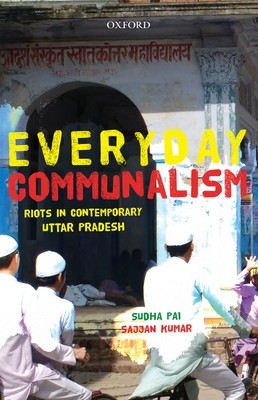
- We will send in 10–14 business days.
- Author: Sudha Pai
- Publisher: Oxford University Press, USA
- ISBN-10: 0199466297
- ISBN-13: 9780199466290
- Format: 14.2 x 22.1 x 2.8 cm, hardcover
- Language: English
- SAVE -10% with code: EXTRA
Reviews
Description
With the demolition of the Babri Masjid and subsequent riots of the late 1980s and 1990s in Uttar Pradesh, the period that followed appeared relatively peaceful. Only at the turn of the century, India witnessed a strong wave of communalism in early 2000s. After the Godhra riots of Gujarat in 2002, Uttar Pradesh saw a series of them--in Mau in 2005, Lucknow in 2006, Gorakhpur in 2007, and Muzaffarnagar in 2013--announcing the return of fundamentalism in the Bharatiya Janta Party's core agenda of Hindutva politics.
Everyday Communalism not only attempts to explore the anatomy of a Hindu-Muslim riot and its aftermath, but also examines the inner workings that enable deep-seated polarization between communities. Pai and Kumar show that frequent, low-intensity communal clashes pegged on routine everyday issues and resources help establish a permanent anti-Muslim prejudice among Hindus legitimizing majoritarian rule in the eyes of an increasingly polarized, intolerant, and entitled majority community of Hindus. Uttar Pradesh's rising cultural aspirations; economic anxieties to move away from its traditionally backward status; a deep caste-marked agrarian crisis; and sharp inequalities and acute poverty further play into the making a new post-Ayodhya phase of Hindutva politics.EXTRA 10 % discount with code: EXTRA
The promotion ends in 15d.08:58:02
The discount code is valid when purchasing from 10 €. Discounts do not stack.
- Author: Sudha Pai
- Publisher: Oxford University Press, USA
- ISBN-10: 0199466297
- ISBN-13: 9780199466290
- Format: 14.2 x 22.1 x 2.8 cm, hardcover
- Language: English English
With the demolition of the Babri Masjid and subsequent riots of the late 1980s and 1990s in Uttar Pradesh, the period that followed appeared relatively peaceful. Only at the turn of the century, India witnessed a strong wave of communalism in early 2000s. After the Godhra riots of Gujarat in 2002, Uttar Pradesh saw a series of them--in Mau in 2005, Lucknow in 2006, Gorakhpur in 2007, and Muzaffarnagar in 2013--announcing the return of fundamentalism in the Bharatiya Janta Party's core agenda of Hindutva politics.
Everyday Communalism not only attempts to explore the anatomy of a Hindu-Muslim riot and its aftermath, but also examines the inner workings that enable deep-seated polarization between communities. Pai and Kumar show that frequent, low-intensity communal clashes pegged on routine everyday issues and resources help establish a permanent anti-Muslim prejudice among Hindus legitimizing majoritarian rule in the eyes of an increasingly polarized, intolerant, and entitled majority community of Hindus. Uttar Pradesh's rising cultural aspirations; economic anxieties to move away from its traditionally backward status; a deep caste-marked agrarian crisis; and sharp inequalities and acute poverty further play into the making a new post-Ayodhya phase of Hindutva politics.

Reviews